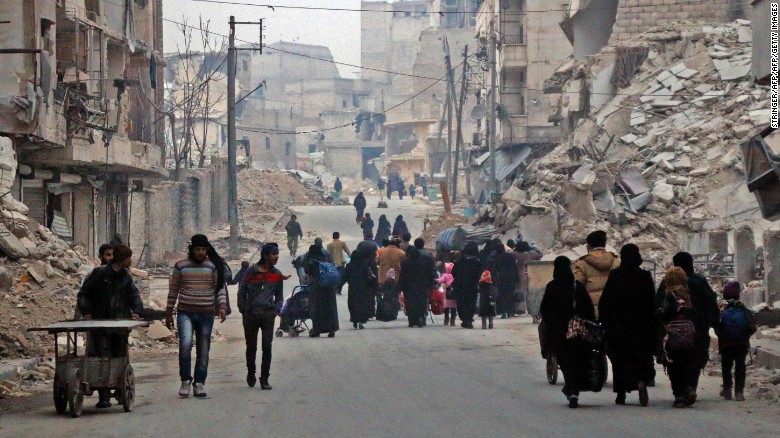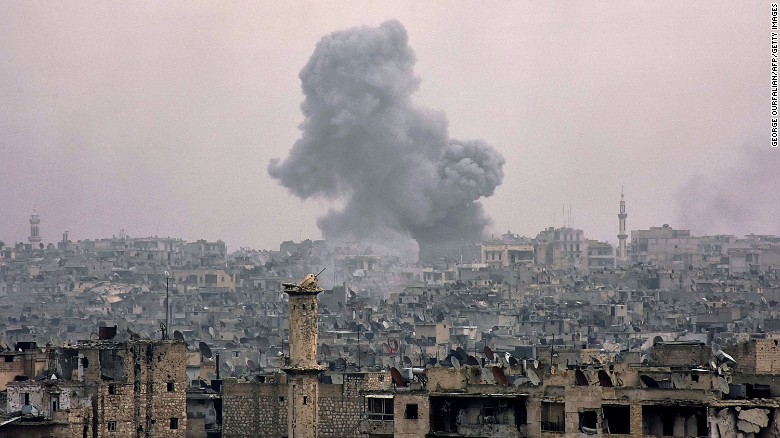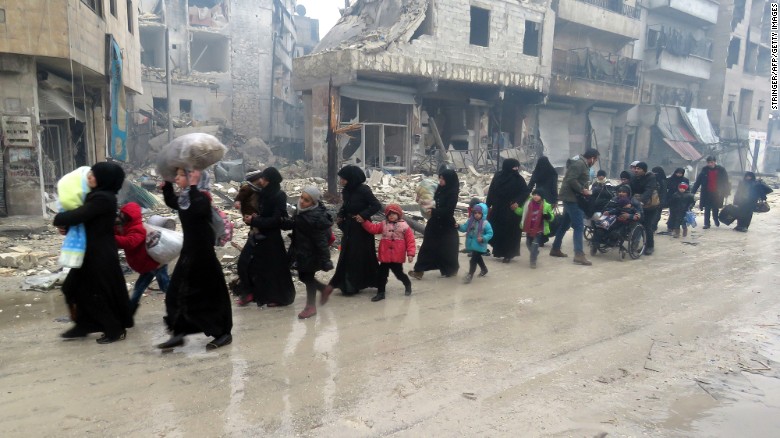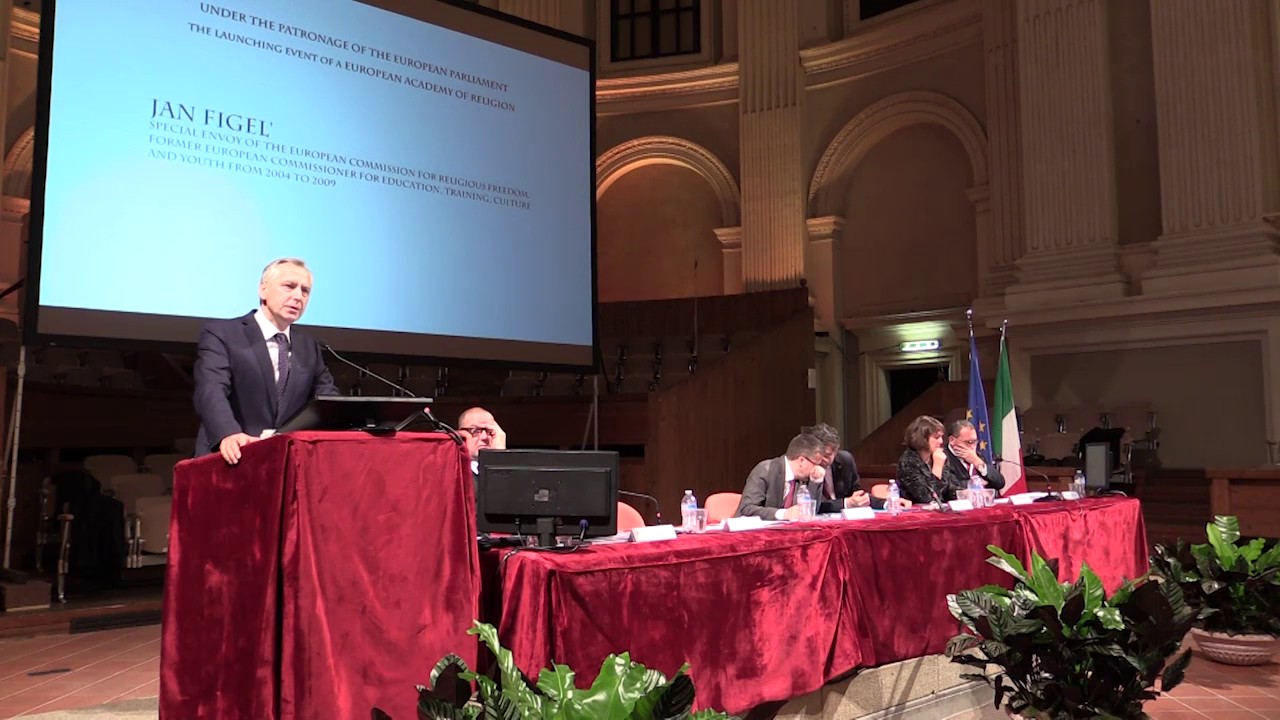(CNN) The US President-elect walks onto the world stage facing a question: Will this century of genocides end or continue?
Donald Trump comes to power amid what has been called „the complete meltdown of humanity“ in Syria, with US Ambassador to the United Nations Samantha Power demanding of UN member states Syria, Iran, and Russia: „Are you truly incapable of shame?“
Power’s speech at a UN Security Council Emergency Briefing on Syria also invoked history’s scenes of horror: „Aleppo will join the ranks of those events in world history that define modern evil, that stain our conscience decades later. Halabja, Rwanda, Srebrenica, and now, Aleppo.“
Her words, while an accurate indictment of the current situation in Syria, are also a prescient reminder that generations of American leaders have been confronted with the savagery of genocide and have failed to take appropriate action.
If the scenes emerging from Aleppo show us anything, it is that the Trump administration must now grapple with this legacy and simply put, do better. The United States, through its executive branch, must call upon the United Nations to take action.
The people of the world, especially those in the darkest of places, are looking to America, the European Union, and the international community of democracies with their hopes, and their very lives, at stake. We should not abandon our basic duties, and these people, yet again.
Trump is coming to power at a dark time in the world. Last March, Secretary of State John Kerry declared that the ethnic cleansing of Christian, Yazidi, and Shia Muslim communities by ISIS forces amounts to nothing less than genocide. That same week, Congress voted unanimously in favor of classifying the atrocities as genocidal.
And yet even after acknowledging that entire communities are being systematically murdered en masse, no one has been able to stop the massacres.
This is not the first time a US president-elect has confronted such stakes. In 2008, a NY Times editorial urged then President-elect Obama to take practical steps to prevent new instances of genocide. Unfortunately, we failed then — and we are failing now.
The current systematic murdering, torture, enslavement, kidnapping, raping and persecution of religious and ethnic minorities in territories dominated by the Islamic State constitutes the very same type of evil that we like to comfortably pretend is confined to only history books. Each time a power-crazed fanatic group is finally beaten down, we view the remains and repeat the promise of „Never Again“ articulated at the Nuremberg Tribunal of 1946.
And each time, we break that promise anew by waiting too long and not working hard enough at our commitment to prevent genocide or crimes against humanity.
Labeling is far from enough, but it is an important first step. Because once we recognize something as genocide, America and other leading nations are then obligated to act.
The US has ratified the Convention on the Prevention and Punishment of the Crime of Genocide, Article I of which establishes a duty for contracting states to „prevent and to punish“ genocide, and Article 8 of which states that such countries „may call upon the competent organs of the United Nations to take such action“ as „appropriate for the prevention and suppression of acts of genocide.“
If soon-to-be-President Trump wants, as he has previously stated, to prosecute criminals, then let him hold these genocidal war criminals responsible for their actions. If, as he claims, he wants to take a firm stand against Islamic terrorism, let him take action in a realm where every day matters, where every hour can mean the difference between life and death for innocent men, women, and children.
If his incoming administration is frustrated with the international community’s status quo, let them break out of the cycle of weak resolutions and empty statements and take seriously the US stake in the „responsibility to protect,“ a political commitment unanimously adopted by all members of the United Nations General Assembly at the 2005 World Summit.
It says that, „If a State is manifestly failing to protect its populations, the international community must be prepared to take collective action to protect populations, in accordance with the Charter of the United Nations.“
Fundamentally, this is not about politics; it is about making a commitment to save people’s lives. In 2016, the American Center for Law and Justice, a Christian-based organization that advocates for constitutional and human rights, published a 7-point plan to stop the ISIS genocide against Christians which can be applied in any instance in which the US recognizes that a genocide is taking place.
These practical steps for governmental intervention include calling upon the various UN organs to formally recognize the genocides taking place, to prosecute war criminals and to establish in-region safe zones for genocide victims, which would also eliminate the need for mass refugee relocation.
We urge President-elect Trump to seriously consider these and other practical suggestions.
After a bitter election season, the American people are understandably having a hard time trying to get past their domestic differences. But to paraphrase Saint-Exupéry, national unity will not come from always seeing eye to eye, but from looking outward together in the same direction.
Stopping genocide around the world could and should serve as a unifying call to action, and a request for every American, including both the President-elect and his opponents, to turn their powerful gazes outwards. Regardless of party affiliation, we must all look back at our failures over the last hundred years and look ahead with a unified vision for a more humane century.
Our collective political energy could best be spent saving lives, and the incoming leader of the free world must immediately commit to doing his part.






